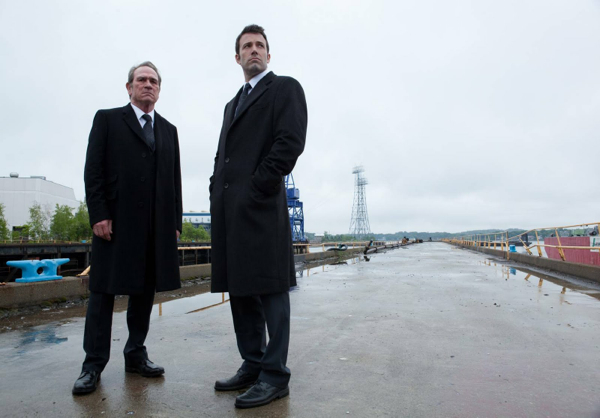Movie review by Greg Carlson
Well-meaning but narratively inert drama “The Company Men” opens with a montage of news clips and soundbites announcing the beginnings of the “global financial meltdown” precipitated by all sorts of logic defying banking products that gathered into a perfect storm of toxicity. CEOs lined their pockets while double-checking that golden parachutes had been properly packed, even as rank and file drones saw their jobs slide toward the chopping block. Veteran producer John Wells, known best for duties on “The West Wing” and “ER” despite a lengthy motion picture resume, makes his feature directorial debut to decidedly mixed results.
Cross-cutting among a trio of plotlines, “The Company Men” tracks the tumble of go-getter MBA Bobby Walker (Ben Affleck), among the first to receive a pink slip at the Boston-area shipping corporation where he has toiled for more than a decade. The devoted family man initially refuses to accept the dire reality of his circumstances, but eventually swallows his pride, sells his Porsche, and straps on a tool belt to work with salty brother-in-law Jack (Kevin Costner). Meanwhile, executive Gene McClary (Tommy Lee Jones) questions the ethics of eliminating entire divisions to inflate share prices and pad the portfolios of top brass.
McClary’s affair with HR hatchet woman Sally Wilcox (Maria Bello, as underutilized as all the women in the movie, including the excellent Rosemarie DeWitt) is no more or less compelling than the storyline tracing the disbelief, panic, and eventual desperation of Chris Cooper’s Phil Woodward, a lower-echelon suit who worked his way to the offices from a position on the manufacturing floor. Cooper, as usual, invests his character with reserves of subtlety and nuance, even though Wells’s screenplay sends him on an easily foreseen journey.
As thematic kin to “Up in the Air,” “The Company Men” somberly and earnestly explores the pain, frustration, and humiliation of sudden termination. Less gripping than non-fiction entries like Charles Ferguson’s “Inside Job” and Alex Gibney’s “Client 9: The Rise and Fall of Eliot Spitzer,” Wells’s character-focused weepie simplifies the contours of modern wage inequities, especially in the figure of Craig T. Nelson’s reptilian CEO. The film also dubiously suggests that even privileged, white, male, multi-millionaires like McClary are suffering, a position some viewers will certainly find a little difficult to swallow.
Although it has drawn a few generous and mostly undeserved comparisons to William Wyler’s 1946 WW II readjustment classic “The Best Years of Our Lives,” “The Company Men” floats in a lukewarm pool of generalities and banalities (“We used to build something here”) that won’t likely hold up over time. All four of the movie’s top-liners are Academy Award recipients (though Affleck and Costner did not win for acting), and the presence of cinematographer Roger Deakins also burnishes the movie with a golden glow. Had “The Company Men” been a pilot for an hour-long network drama, Wells’s rhythm and pacing – which races from efficient introductions to a leisurely, almost repetitious, hammock-like comfort zone of scenes before tooling an abrupt, truncated conclusion – would have satisfactorily set the stage for a season of episodes.
